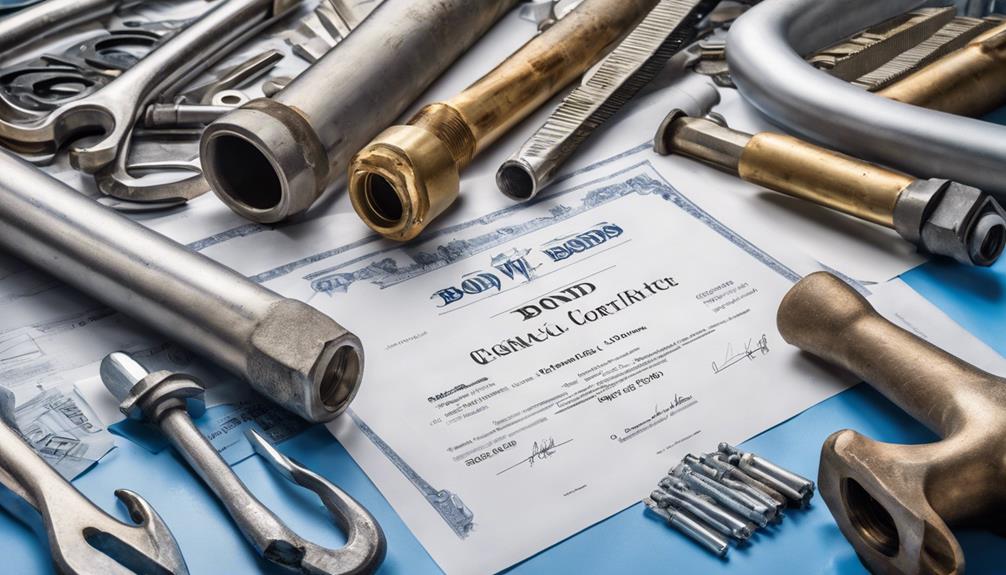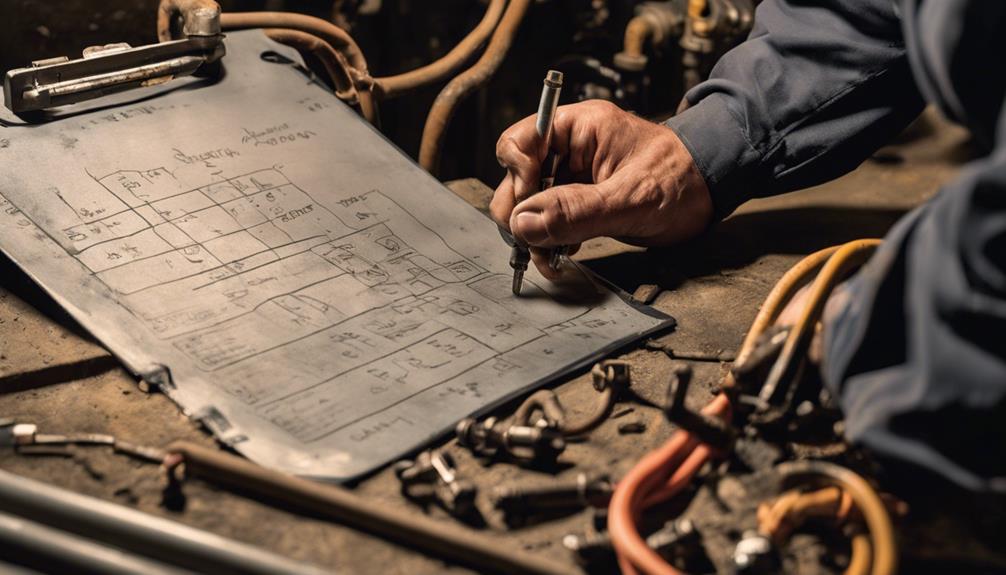If you're a mechanical contractor in Falls Church, VA, understanding the nuances of a mechanical contractor bond is essential. This bond not only protects your clients but also enhances your professional reputation in a competitive market. You might wonder what specific types of bonds exist and how they can impact your projects. Moreover, the process of obtaining one and the costs involved could influence your decisions moving forward. The implications of these bonds extend beyond mere compliance, so let's explore what you need to know to navigate this critical aspect of your business effectively.
What Is a Mechanical Contractor Bond?

A mechanical contractor bond is a type of surety bond that protects clients and the public against potential financial losses caused by a contractor's failure to fulfill their duties or adhere to regulations.
When you hire a mechanical contractor, you're trusting them to complete the job according to the agreed specifications and local laws. This bond serves as a safeguard, ensuring that if the contractor doesn't meet their obligations, you have recourse to recover your losses. Additionally, these bonds are often required for licensing in many professions, adding an extra layer of assurance for clients essential for various industries.
The bond involves three parties: you, the contractor, and the surety company. The surety company guarantees that the contractor will perform their work properly. If the contractor fails to do so, you can file a claim against the bond to seek compensation.
It's crucial to know that the contractor must reimburse the surety for any claims paid out, meaning they've a strong incentive to maintain compliance.
In many jurisdictions, obtaining this bond is a legal requirement for mechanical contractors. By ensuring they're bonded, you can have peace of mind knowing that your project is protected, and that the contractor is committed to upholding their responsibilities.
A mechanical contractor bond is a vital tool in fostering trust and accountability in the construction industry.
Why Is the Bond Necessary?
While you might think hiring a mechanical contractor is straightforward, the bond becomes necessary to protect your interests and ensure compliance with industry standards. This bond acts as a safety net, ensuring that the contractor adheres to local regulations and completes the work as agreed. If the contractor fails to meet their obligations, the bond provides a financial remedy, allowing you to recover losses.
Additionally, securing a performance bond demonstrates that the contractor is prepared to fulfill their project obligations and protects you from potential contractor default.
Moreover, having a bond in place shows that the contractor is committed to professionalism and integrity. It gives you peace of mind knowing that they're backed by a surety company, which evaluates their qualifications and reliability. This commitment can save you from potential headaches during the project.
Additionally, the bond helps maintain quality standards within the industry. By holding contractors accountable, it encourages them to perform their work diligently and ethically. This not only protects you but also contributes to the overall reputation of mechanical contractors in Falls Church.
In essence, the bond is an essential part of the hiring process. It safeguards your investment and fosters a trustworthy relationship between you and your mechanical contractor, ensuring that your project runs smoothly from start to finish.
Types of Mechanical Contractor Bonds

When hiring a mechanical contractor, understanding the different types of bonds available can significantly impact your project's success. There are several key types of mechanical contractor bonds you should know about, including those that are critical for ensuring compliance with state regulations, as outlined in Michigan Surety Bonds.
First, you have the performance bond, which guarantees that the contractor will complete the project according to the contract terms. If they fail, the bond provides financial protection, allowing you to hire another contractor to finish the work.
Next is the payment bond, ensuring that subcontractors and suppliers get paid for their work and materials. This bond protects you from potential liens or legal issues that could arise if the contractor doesn't fulfill their payment obligations.
Another important type is the maintenance bond. This bond guarantees that the contractor will maintain their work for a specified period after project completion. If any issues arise, the bond covers the costs of repairs.
Lastly, there's the license bond, which ensures compliance with local laws and regulations. If the contractor violates these rules, the bond helps cover any resulting fines or penalties.
Understanding these bonds equips you to make informed decisions, ensuring your project runs smoothly and efficiently.
Benefits of Having a Bond
Having a bond provides significant advantages for both project owners and contractors. For project owners, a bond acts as a safety net. It ensures that if a contractor fails to complete the project or meet specific standards, they can recover financial losses. This peace of mind allows you to invest in projects without the constant worry of potential losses.
For contractors, having a bond enhances credibility. It shows that you're committed to professionalism and accountability, which can help you stand out in a competitive market. Clients often prefer working with bonded contractors, as it reflects a level of trustworthiness and financial stability.
Additionally, being bonded can open doors to larger projects that might require this assurance. Furthermore, bonds can help streamline the bidding process. When you're bonded, clients may feel more confident in your ability to deliver quality work on time, which could lead to more contracts and opportunities.
How to Obtain a Bond

To obtain a bond, you'll need to follow a clear process that involves gathering essential documentation and demonstrating your financial stability.
Start by identifying the type of bond you need, as different bonds serve various purposes. Next, collect required documents, which typically include proof of business registration, financial statements, and any relevant licenses.
Once you've gathered your documentation, you can approach a surety company or a bonding agent. They'll help you navigate the application process, assess your information, and determine the bond amount you require.
Be prepared to provide details about your business, including your experience and project history, as this will impact your bond approval.
After submitting your application, the surety company will evaluate your creditworthiness and financial standing. This may involve a thorough review of your personal and business finances, so ensure everything is in order.
If approved, you'll receive your bond, often requiring you to pay a premium based on the bond amount and your financial assessment.
Requirements for Bond Application
Securing a bond requires you to meet specific application requirements that vary depending on the type of bond you need.
Before you apply, gather necessary documentation such as your business license, proof of insurance, and any permits relevant to your mechanical contracting work in Falls Church. You'll also need to provide your financial statements, which demonstrate your business's stability and ability to fulfill contractual obligations.
Next, be prepared to share your business history, including any past projects, references, and details about your experience in the mechanical contracting field. This information helps the surety company assess your qualifications and the risk involved in issuing the bond.
Additionally, you might need to submit personal financial information if you're a sole proprietor or if your business is closely held.
The surety will evaluate your credit score and financial health, so it's a good idea to check your credit report beforehand.
Costs Associated With Bonds

When considering a mechanical contractor bond, it's essential to understand the costs involved. The bond premium is usually a percentage of the total bond amount, often ranging from 1% to 3%. This percentage can vary based on your credit score, business financials, and experience in the industry. If you've got a solid credit history, you'll likely pay a lower premium.
Additionally, you might encounter other fees, such as application fees or underwriting fees, which can add to your initial outlay. It's crucial to ask the surety company for a breakdown of all costs involved to avoid surprises later on.
Moreover, you should consider the bond amount required by the jurisdiction, as higher amounts will lead to higher premiums.
Keep in mind that while these costs might seem steep at first, they're a necessary investment to ensure compliance and protect your business.
Renewal and Maintenance of Bonds
Renewing and maintaining your mechanical contractor bond is crucial for uninterrupted operations. As a contractor, you need to stay on top of your bond renewal dates. Typically, bonds need to be renewed annually, so set reminders well in advance. This proactive approach ensures you won't face lapses that could hinder your ability to work legally.
When it's time to renew, review the terms of your bond and any changes in regulations or requirements. You might find that you need to provide updated documentation or financial statements. Keeping your records organized and accessible will make this process smoother.
Additionally, maintain open communication with your surety company. They can offer guidance on any changes in bonding requirements and help you understand the renewal process.
If your business grows or changes, such as expanding services or moving into new areas, your bond may need adjustments to reflect these changes.
Common Bonding Issues

Despite your best efforts to keep your bond up to date, you may still encounter common bonding issues that can complicate your operations. One significant concern is insufficient credit history. If your financial standing isn't strong enough, surety companies may hesitate to issue or renew your bond.
Another issue is incomplete or inaccurate documentation. If you submit incorrect information or fail to provide all necessary paperwork, it can delay the bonding process. Additionally, changes in your business operations or ownership can trigger a need for a new bond, which may not be immediately apparent.
You might also face issues related to claims against your bond. If a claim arises due to a subcontractor or supplier's non-payment, it can jeopardize your bond's status and damage your reputation.
Lastly, remember that bonding requirements can vary by project or municipality. If you're unaware of these specific requirements, you could find yourself in a bind.
Being proactive and understanding these common challenges will help you navigate the bonding process more effectively and minimize disruptions to your projects. Keeping open lines of communication with your surety provider can also help you address any issues before they escalate.
Resources for Contractors in Falls Church
Numerous resources are available for contractors in Falls Church to help you navigate the complexities of the construction industry. Local organizations, such as the Falls Church Chamber of Commerce, provide networking opportunities, educational workshops, and advocacy for small businesses.
Joining this chamber can connect you with other professionals and potential clients.
You should also explore the Virginia Department of Professional and Occupational Regulation (DPOR) website. It offers valuable information on licensing and regulations specific to mechanical contracting.
The DPOR provides guidelines on how to maintain compliance, which is crucial for protecting your business.
Additionally, consider leveraging online resources like the National Association of State Contractors Licensing Agencies (NASCLA). This can help you stay updated on changes in regulations and best practices across the nation.
Conclusion
In Falls Church, having a mechanical contractor bond isn't just a formality—it's essential for your business's credibility and success. By securing this bond, you protect both yourself and your clients, ensuring you meet all financial and regulatory obligations. Remember to stay informed about the types of bonds available and the costs involved. With the right preparation and understanding, you can navigate the bonding process smoothly and build trust in your contracting endeavors.


